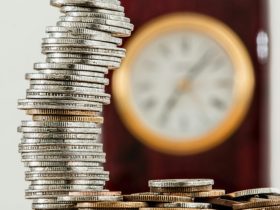Consumer price inflation accelerated in January. Year-on-year inflation rose to 17.5 percent in the first month of the year from 15.8 percent in December. On a month-on-month basis, inflation rose by six percent. The Czech Statistical Office (CSO) released the data on Friday.
“The growth was significantly affected by the ending of the energy saving tariff for households in the form of an energy allowance. The prices of electricity increased by 36.4 percent year-on-year, natural gas increased by 87 percent, water charges increased by 16.3 percent, sewerage charges increased by 30.3 percent, and heat and hot water increased by 44.7 percent,” said Pavla Šedivá, head of the consumer price statistics department at the CSO.
Rising food prices
The rise also influenced the year-on-year growth in the price of food and non-alcoholic beverages. For example, the cost of rice increased by 35.1 percent, flour by 44.2 percent, pork by 36.8 percent, semi-skimmed long-life milk by 39.5 percent, eggs by 85.0 percent, oils, and fats by 31.5 percent, and sugar by 84.7 percent.
Also contributing significantly to the month-on-month increase was the end of the austerity tariff. The price of electricity rose by 139.8 percent compared to December. Heat and hot water consumption rose by 23.5 percent, sewerage by 30.3 percent, and water charges by 16.3 percent. Natural gas was “only” 2.2 percent more expensive.
Among foodstuffs, the prices of soft drinks, in particular, rose by 7.6 percent. The cost of fruit rose by almost a tenth, while the price of vegetables rose by 7.3 percent. Significant price increases also occurred for spirits (+9.2 percent), beer (+8.9 percent), and wine (+8.5 percent).
On the other hand, fuel and oil prices were lower than in December, falling by 1.7 percent. Cars were 1.1 percent cheaper. Among foodstuffs, the prices of butter, down 7.2 percent, and semi-skimmed long-life milk, down 7.1 percent, were notably lower, the statisticians added.
Overall, prices of goods rose by 8.7 percent, and services expenses grew by 1.9 percent.
Analysts had expected a significant increase in inflation precisely because the effect of the energy-saving tariff was dropped from the statistics. The traditional January adjustment of price lists for goods and services was also expected to play a role.
Analysts: Summer in single digits
“While administrative interventions tweaked inflation in the final months of last year, these were ended in January, leading to a jump in prices. In addition, some traders opted for a strategy of selling less with higher margins, which was reflected in the revaluation at the beginning of the year,” BHS chief economist Štěpán Křeček assessed the January figures.
He also pointed out that higher inflation was being prevented by the strong exchange rate of the koruna, which was making imports into the Czech Republic cheaper and thus dampening imported inflation from abroad. “We expect inflation to fall in the coming months and reach single-digit levels during the year. However, it will still reach multiples of the inflation target,” Křeček added.
Akcenta analyst Miroslav Novak also said inflation could reach single-digit levels in the summer. However, he warns that the high inflationary environment in the domestic economy continues to persist.
“It is necessary to consider that very high inflation will negatively impact household incomes and consumption throughout this year. The ČNB Bank Board will no longer raise interest rates, but on the other hand, we will probably wait until the very end of this year for rates to fall,” Novák said.







%%
My web-site … search engine optimization agency
%%
Here is my homepage :: cat cbd treats (http://www.ktccardgift.Com)
%%
Here is my web site :: bunk bed price uk (Ada)
%%
My web blog adhd dubai
%%
Also visit my web site – Togel online; glad2Bhome.Com,
%%
Feel free to visit my page: idn poker (https://www.boxingforum24.com/proxy.php?Link=https%3A%2F%2Fmilanka.co.uk)
%%
Here is my site … buy Full spectrum Cbd Oil
%%
Check out my blog upvc window repairs near me – https://www.repairmywindowsanddoors.co.uk/stevenage-windowrepair/ –
%%
Also visit my web-site :: Tops Thc Shop
%%
Review my site :: togel online (Caroline)
%%
My web site … Best CBD Bath Bombs For Sale Online
%%
Here is my homepage clive erb’s palsy
%%
Feel free to visit my web-site – best full spectrum cbd
%%
Stop by my blog post Window repair near Me
%%
Feel free to surf to my homepage; Best Free standing dance pole
%%
My webpage – togel online [http://senohvolleyball.org]
%%
my website: spare
%%
Here is my web blog; judi Bola (cr.naver.Com)
%%
my homepage; togel (http://avira.Mybb3.Net/loc.php?url=Https://www.dominik.cyou)
%%
My web page :: affordable seo near Me
%%
Look at my web page otsego Injury
%%
Feel free to visit my webpage … replacement double glazing
(Arnold)
%%
Here is my web page :: togel singapore – http://test.Hoshikaze.net/hk-forum/ucp.php?mode=logout&redirect=https://www.dinah.top/ –
%%
Also visit my blog post duplicate Motorcycle key
%%
My page … Affordable Seo
%%
Also visit my web page adhd centre manchester (Leanna)
%%
Also visit my web site … buy cbd for cats uk
%%
Look at my site: joker123 gaming – Zulma,
%%
My page sbobet (http://www.gxnfw.com/)
%%
Here is my web-site lewistown railroad injuries
%%
my homepage … judi bola (https://www.opticunion.org)
%%
Review my web-site: replacement Windows near me
%%
Also visit my web-site mobile Key cutting For cars
%%
Visit my site … Window Repairs
%%
Here is my page Cheap Cbd Vapes
%%
Feel free to visit my website – costs
%%
Here is my web site Cbd vape cartridges For sale
%%
Review my web-site :: nearme
%%
My homepage togel singapore (http://m.lomoshop.kr/Member/login.html?nomemberorder=&returnurl=http%3a%2f%2ftamsin.cyou)
%%
my blog post :: cbd vape oil legal
%%
Also visit my web blog … scotland private adhd assessment
%%
my web blog poker online [https://tatsumi-kyotaro.hatenablog.com/iframe/hatena_bookmark_comment?canonical_uri=Https%3a%2f%2frhianna.top]
%%
Check out my web page … Window doctor
%%
Also visit my web page – northvale Erb’s Palsy
%%
Look into my website Pragmatic Play (En.Eyefocus.Co.Kr)
%%
My webpage – delta 8 Near
%%
Look at my homepage – local
I recently tried how long for cbd to kick in for the prime time and was pleasantly surprised past the results. Initially skeptical, I initiate that it significantly helped with my appetite and doze issues without any remarkable side effects. The fuel was effortless to speak, with nitid dosage instructions. It had a indulgent, lusty grain that was not unpleasant. Within a week, I noticed a patent improvement in my blanket well-being, ardour more relaxed and rested. I comprehend the ingenuous technique to wellness CBD offers and plan to pursue using it.
Thank you! I enjoy it.
There’s is no such thing as a “Macedonian” sic, “church”All Macedonians are under the Ecumenical Patriarchate or Church of Greece
I definitely did not understand that Learnt one thing new today! Thanks for that
Link pyramid, tier 1, tier 2, tier 3
Level 1 – 500 references with placement contained in articles on publishing domains
Level 2 – 3000 web address Rerouted hyperlinks
Lower – 20000 hyperlinks mix, comments, posts
Using a link structure is advantageous for online directories.
Demand:
One hyperlink to the site.
Query Terms.
Valid when 1 key phrase from the page topic.
Note the complementary feature!
Crucial! First-level hyperlinks do not overlap with 2nd and 3rd-order links
A link structure is a mechanism for enhancing the movement and backlink portfolio of a online platform or social media platform
Unlock new levels, earn massive rewards Lucky cola